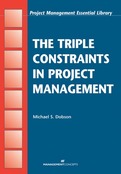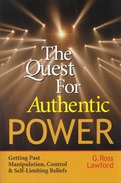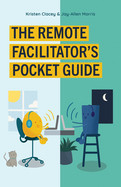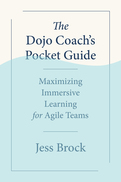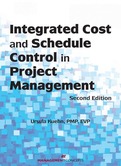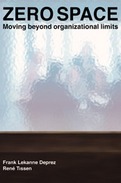Search Results: "building the future"
Results 721-726 of 1218
From the novice to the most experienced and senior project manager, triple constraint issues are at the core of the most crucial decisions about a project. The Triple Constraints in Project Management explores the triangle of time, cost, and performance that bounds the universe within which every project must be accomplished – and shows how controlling the hierarchy of constraints can mean the difference between success and failure on virtually any project.
Authentic power-the power to consistently obtain what we truly desire-comes from within. Such power, the power to determine your own destiny, isn't achieved by imposing your will on others. In fact, Ross Lawford explains, power based on authority, control, strength, and status is not only ineffective, it is usually short-lived or more illusion than reality.
Drawing on psychology, theology, and business, Lawford outlines a new view of power based on authenticity and provides practical pointers for achieving your deepest desires without manipulation, coercion, or intimidation. He provides strategies for applying this new view of power in every aspect of your life-including your work, your family, and personal relationships.
- Presents a new concept of power that will help readers achieve their deepest desires without manipulation, coercion, or intimidation
- Shows how conventional beliefs about power actually prevent us from being truly powerful
- Recommends strategies for applying this new view of power in a variety of settings-in organizations, in the family, and in relationships in general
This approach to remote facilitation makes virtual meetings powerful means of collaboration using proven techniques to accommodate a diversity of cultures, locations, and personalities.
Many people struggle with remote meetings: a cocktail of factors, such as technical barriers and invisible group norms, increase the uncertainty and risk of the already vulnerable task of collaborating and sharing ideas. When remote meetings go badly, they go really badly. Few things feel as lonely and intimidating as speaking to a screen with unreadable faces staring back in silence. This book will help you improve the quality of your remote meetings. With a little awareness, some planning, and some practice, you can make your remote meetings an effective, engaging, and powerful mechanism for collaboration within your organization.
This book is for anyone seeking to get more value from remote meetings. Whether you're a seasoned facilitator, a new facilitator, or someone hoping to improve team meetings, you will be empowered with principles and actionable methods to enhance your organization's effectiveness.
Many people struggle with remote meetings: a cocktail of factors, such as technical barriers and invisible group norms, increase the uncertainty and risk of the already vulnerable task of collaborating and sharing ideas. When remote meetings go badly, they go really badly. Few things feel as lonely and intimidating as speaking to a screen with unreadable faces staring back in silence. This book will help you improve the quality of your remote meetings. With a little awareness, some planning, and some practice, you can make your remote meetings an effective, engaging, and powerful mechanism for collaboration within your organization.
This book is for anyone seeking to get more value from remote meetings. Whether you're a seasoned facilitator, a new facilitator, or someone hoping to improve team meetings, you will be empowered with principles and actionable methods to enhance your organization's effectiveness.
This go-to guidebook helps agile practitioners overcome upskilling challenges in their organizations through effective Dojo coaching.
Agile has changed the way we work in our organizations. But by demanding constant innovation and product delivery, individuals and teams struggle to find time to improve their skills. That's where the Dojo comes in. Dojo-style coaching encourages this kind of learn-by-doing form of skill development, one where guided breakthroughs and upskilling happen while delivering on current work.
In this useful pocket guide, experienced Dojo coach Jess Brock delivers practical advice based on her extensive experience in real-world Dojos. Combining proven tactics and a comprehensive tool kit, along with actionable tips needed to drive engagement in both physical and virtual Dojo spaces, this pocket guide will equip you to maximize the impact of your Dojo.
Whether you are a seasoned pro or you are just starting to develop your Dojo coaching skills, this no-nonsense book will help Dojo coaches at any stage of their journey.
Agile has changed the way we work in our organizations. But by demanding constant innovation and product delivery, individuals and teams struggle to find time to improve their skills. That's where the Dojo comes in. Dojo-style coaching encourages this kind of learn-by-doing form of skill development, one where guided breakthroughs and upskilling happen while delivering on current work.
In this useful pocket guide, experienced Dojo coach Jess Brock delivers practical advice based on her extensive experience in real-world Dojos. Combining proven tactics and a comprehensive tool kit, along with actionable tips needed to drive engagement in both physical and virtual Dojo spaces, this pocket guide will equip you to maximize the impact of your Dojo.
Whether you are a seasoned pro or you are just starting to develop your Dojo coaching skills, this no-nonsense book will help Dojo coaches at any stage of their journey.
The Practical, Precise, and Proven Approach to Integrated Cost and Schedule Control!
This trusted project management resource, now in its second edition, includes expanded coverage of how integrated cost and schedule control works within the federal government. With the renewed emphasis on transparency in government, the processes detailed in this book are particularly relevant.
Building on the solid foundation of the first edition, this updated second edition includes new material on:
• Project planning in the federal government
• Integrated baseline reviews
• Federal requirements for an ANSI/EIA-748 compliant earned value management system
• Federal requirements for performance reports
Integrated Cost and Schedule Control in Project Management, Second Edition, continues to offer a practical approach that is accessible to project managers at all levels. The step-by-step presentation, numerous case studies, and instructive examples give practitioners relevant material they can put to use immediately.
This trusted project management resource, now in its second edition, includes expanded coverage of how integrated cost and schedule control works within the federal government. With the renewed emphasis on transparency in government, the processes detailed in this book are particularly relevant.
Building on the solid foundation of the first edition, this updated second edition includes new material on:
• Project planning in the federal government
• Integrated baseline reviews
• Federal requirements for an ANSI/EIA-748 compliant earned value management system
• Federal requirements for performance reports
Integrated Cost and Schedule Control in Project Management, Second Edition, continues to offer a practical approach that is accessible to project managers at all levels. The step-by-step presentation, numerous case studies, and instructive examples give practitioners relevant material they can put to use immediately.
Zero Space
2002
What would happen if you could achieve business success without owning any assets, but could simply enjoy the benefits of them? What if companies were able to react instantly to changing circumstances by operating in negative time? What if you didn't need management to run your business?
Zero Space defines a business model in which an organization achieves success without owning assets or needing management. In a zero space organization, knowledge is the only true currency and people are the business's assets and its investors in future success.
Through eight new organizational principles the authors illustrate how "zero-mindedness" is essential for the new economy. Just as organizations will have to exist in less tangible, less prescribed forms, so will thinking have to become less departmentalized, less closely guarded. This new open-mindedness or "zero mind-set" targets knowledge so that an organization applies it when and where it is really needed.
The authors-two top executives at one of the "big five" accounting and consulting firms-show how to create a zero-space organization: a value-adding, quick-reacting, non-centralized, non-standardized, innovation-generating workplace for dedicated talent.What would happen if you could achieve business success without owning any assets, but could simply enjoy the benefits of them? What if companies were able to react instantly to changing circumstances by operating in negative time? What if you didn't need management to run your business?
Zero Space defines a business model in which an organization achieves success without owning assets or needing management. In a zero space organization, knowledge is the only true currency and people are the business's assets and its investors in future success.
Through eight new organizational principles the authors illustrate how "zero-mindedness" is essential for the new economy. Just as organizations will have to exist in less tangible, less prescribed forms, so will thinking have to become less departmentalized, less closely guarded. This new open-mindedness or "zero mind-set" targets knowledge so that an organization applies it when and where it is really needed.
The authors-two top executives at one of the "big five" accounting and consulting firms-show how to create a zero-space organization: a value-adding, quick-reacting, non-centralized, non-standardized, innovation-generating workplace for dedicated talent.
- A fundamental rethinking of how organizations are designed by two top executives at one of the "big five" accounting and consulting firms
- Shows why being "zero-minded"-forgetting traditional organizational constraints and starting from scratch-is crucial for success in today's economy
- Explains how to create the zero-space organization: a value-adding, quick-reacting, non-centralized, non-standardized, innovation-generating workplace for dedicated talent


